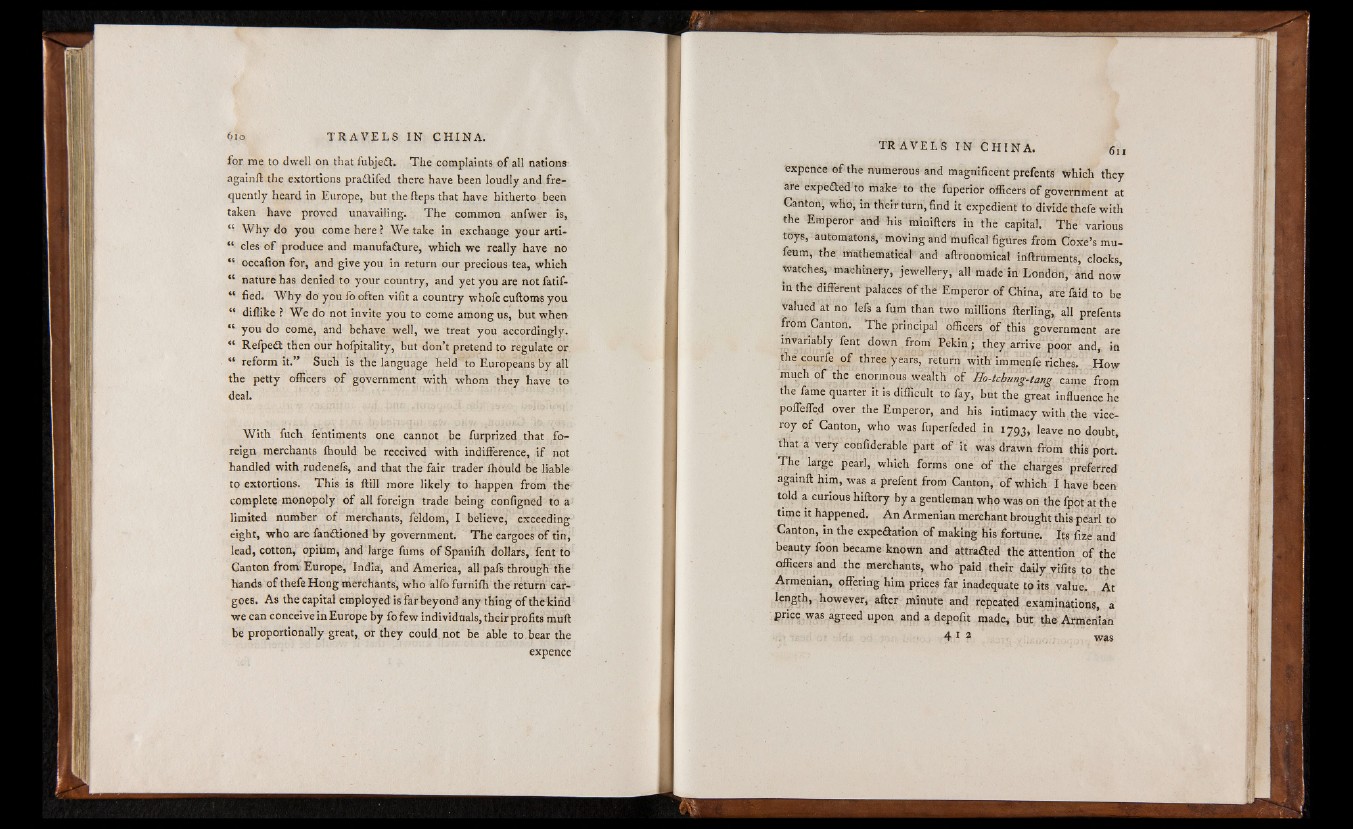
for me to dwell on that fubjeit. The complaints o f all nations
againft the extortions pra&ifed there have been loudly and frequently
heard in Europe, but the fteps that have hitherto been
taken have proved unavailing. The common anfwer is,
“ W h y do you come here ? We take in exchange your arti-
“ cles o f produce and manufacture, which we really have no
“ occafion for, and give you in return our precious tea, which
“ nature has denied to your country, and yet you are not fatif-
“ fied. Wh y do you fo often vifit a country whofe cuftoms you
“ diflike ? We do not invite you to come among us, but when
“ you do come, and behave well, we treat you accordingly.
“ RefpeCt then our hofpitality, but don’t pretend to regulate or
“ reform it.” Such is the language held to Europeans by all
the petty officers o f government with whom they have to
deal.
With fuch fentiments one cannot be furprized that foreign
merchants ihould be received with indifference, i f not
handled with rudenefs, and that the fair trader Ihould be liable
to extortions. This is ftill more likely to happen from the
complete monopoly o f all foreign trade being configned to a
limited number o f merchants, feldom, I believe, exceeding
eight, who are fanCtioned by government. The cargoes o f tin,
lead, cotton, opium, and large firms o f Spaniih dollars, fent to
Canton from Europe, India, and America, all pafs throug"h the
hands o f thefe Hong merchants, who alfofurriiih the return cargoes.
As the capital employed is far beyond any thing o f the kind
we can conceive in Europe b y fofew individuals, their profits mull
be proportionally great, or they could, not be able to bear the
expence
expence o f the numerous and magnificent prefents which they
are expeclled to make to the fuperior officers o f government at
Canton, who, in their turn, find it expedient to divide thefe with
the Emperor and his minifters in the capital. Thé various
toys, automatons, moving and mufical figures from Coxe’s mu-
feum, the mathematical and aftronùmical inftrutnents, clocks,
watches, machinery, jewellery, all made in London, and now
in the different palaces o f the EmperOr o f China, aïe laid to be
valued at no lefs a fum than two millions fterling, all prefents
from Canton. The principal officers o f this government are
invariably fent down .from Pekin ; they arrive poor and, in
tné courfe o f three years, return with immenfc riches. How-
much o f the enormous wealth o f Ho-tchung-tang came from
the fame quarter it is difficult to ïa y , but the great influence he
poffeffed over the Emperor, and his intimacy with the viceroy
o f Canton, who was fuperfeded in 1793, leave no doubt,
that a very confiderable part o f it was drawn from this port.
The large pearl, which forms one o f the charge's preferred
againft him, was a prefent from Canton, o f which I have been
told a curious hiftory by a gentleman who was on the fpot at the
time it happened. A n Armenian merchant brought this péarl to
Canton, in the expectation o f making his fortune. Its fiée and
beauty foon became known and attradled the attention o f the
officers and the merchants, who paid their daily vifits to the
Armenian, offering him prices far inadequate to its value. A t
length, however, after minute and repeated examinations, a
price was agreed upon and a depofit made, but the Armenian
4 1 2 was